Stranger 2 (2020) Episodes 5-6: Rambles and Grumbles
As much as I am reluctant to say this, I am really struggling with season 2 right now. There are several reasons for that. The pacing is the obvious factor. The window dressing is another and then there’s the relentless information overload. It almost feels like I’m watching an entirely different drama from the first season. It’s not as if I’m new to political or corruption dramas either. I watch them fairly routinely but there’s something about this script that makes the juggling act dizzying to watch. I’ve been following all manner of politics since I was old enough to read and understand newspapers but this season seems to have sucked much of the intrigue out of the franchise. I’m just not entirely sure what I did sign up for now. The differences are all the more glaring as I rewatch the first season.
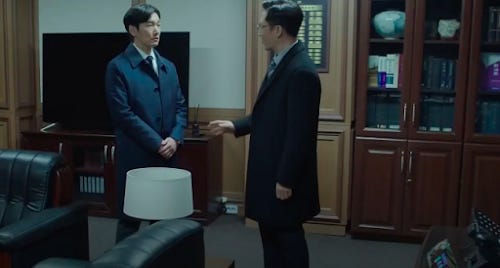
The theme, premise and messaging of the show come through loud and clear. It’s the laborious storytelling that’s taking some of the enjoyment away. Nonetheless, it’s not all bad. The leads are still doing what they do well. Although until Episode 6, it seemed as if they were being sidelined by more flamboyant, bombastic characters.
The level of cynicism was turned up several notches in the last few episodes. It’s one thing to hear about all the political blackmail that bureaucrats play amongst themselves but it’s still startling to hear that kind of talk leave the lips of individuals with unfiltered frankness. Choi “Dirt Collector” Bit is very adept at it and I imagine she would have to be to get to where she is. I don’t doubt she’s a shrewd operator who’s running her own affirmative action programme with one hand but one gets the feeling that she’s offering Yeo-jin a Faustian pact with the other. It’s clear that she’s just doing what everyone in her position does not just for the organization but also for self-interest. Sure, it would be good for there to be more women holding top positions in the force if they qualify but from my perspective it might be more important to have quality officers on the field. This is the incongruity that I feel and I’m sure it’s deliberate. Just looking at the police as a public sector organization (and I don’t just want to pick on the cops either) for instance, it’s clear that there are systemic problems… of nepotism, corruption and even bullying. In other words, it is a microcosm of all the problems of SK society. So it’s laughable… to me at least… that we have the cops and the prosecutors squabbling over investigative rights when both houses need a good spring clean. I imagine this is where the show is going with all of this (albeit at snail’s pace). Look, I’m sure there are good arguments to be made for either side of the debate. But the more the audience is privy to all the ridiculous political blackmailing that goes on behind the scenes, the more I’m convinced that neither side “deserves" anything. If anything, the powers of certain people should probably be curtailed. The entire criminal justice system is appearing to be one intricate extortion racket in arm twisting.
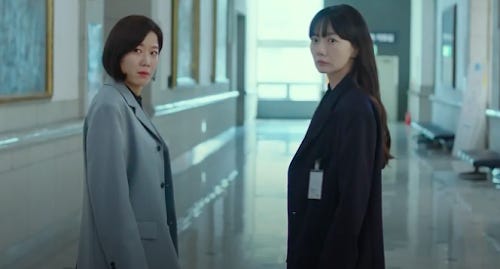
TBH I don’t know what to think of Chief Woo. While Choi Bit seems baldly ambitious, Woo Tae-ha seems much more enigmatic. On the surface he seems to play the game that everyone else is playing while giving the impression he’s running another game on the side. I wonder from time to time if he didn’t bring Si-mok in just for his “image”. He must know that Si-mok is something of a maverick and not easily manipulated. In fact, I feel that we’ve been plonked right in the middle of a gigantic chess game and the pieces are being shifted around at some unknown person(s) pleasure.
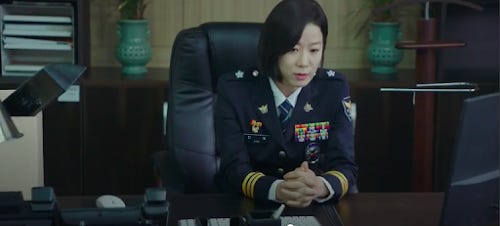
Although I consider myself a realist, it is chilling to think that competent people are obliged to chuck their consciences at the door before they can reach the higher echelons of these organisations. There’s obviously full frontal gatekeeping going on. It's nothing surprising. Happens everywhere. But the egregious cynicism of Episode 6 even managed to send shivers down my spine.
It’s clearly the case that the likes of Si-mok, Yeo-jin and even Dong-jae are merely cogs in the machinery that they think they support. It’s not hard to see why Yeo-jin’s morale is at a low. She wants to support her organisation except that she’s having a hard time with what that organisation is. Is she barracking for a side just because she happens in it? She didn’t join a side necessarily to be a part of the war. After what she’s been asked to do she must be questioning on own reasons for being a cop in the first place. Is it her job to protect the police’s interest even if that goes against her own conscience or even that works against public interest.
It's rough on everyone (audience included) that Si-mok and Yeo-jin are seemingly on opposite sides of the investigative rights dispute. I don’t think they are, when all is said and done. But right now the line has been drawn by other people and they’re being forced to toe that line. However, they are individuals who have aspirations for themselves and their respective organizations but that comes into conflict with what the people who run these "cabals" are trying to achieve. That’s why our duo are clinging to self for dear life. Si-mok clings for dear life to his own sense of self in a way no one else does in that world. Si-mok, the most radical individualist of them all, is the textbook outsider. He is perceived as a danger because he can’t be controlled in the way he superiors would like to. He is the anti-social personality that doesn’t have the usual need to belong or to please. He’s not an idealist either. That’s why he can be the Dirty Harry of the prosecution’s office taken out of the proverbial drawer when needed. He does what he has to even if he offends all the right people. He beats to a different drum. Chief Kang knows better than most that someone like him is needed in the office because he is dogged to a fault. But he is wary of the potential for disruption that Si-mok poses.
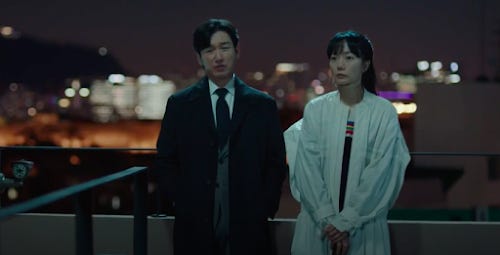
I am one of those who wouldn’t mind a low-key romance between the leads. The foundations are already there. While Si-mok maintains a certain level of aloofness with most, Yeo-jin is someone he clearly treats differently. His relationship with her is differentiated by his consideration for her as he follows up on orders dished out by Chief Woo related to Assemblyman Nam. He does his own legwork and then takes it to her for confirmation. He understands her dilemma only too well as talk about the restriction line surfaces in their late night chat. At times taking a stand doesn’t seem to make a difference in the scheme of things. Structurally nothing changes. But maybe what’s at stake is something much more personal.
The machinery of the organization corrupts but it’s a relief that not everyone is pulled into its dragnet. But they have to actively, intentionally fight against it. It’s easier to just go along with everything but there’s a trade-off. The longer the person plays the game, the more they lose themselves and all the reasons why they embarked on that journey in the first place.
I'm still waiting to see how the Hanjo power struggle fits into all of this in a more substantive way. I don't find battles between entitled rich people particularly compelling. I'm not really buying into Lee Yeo-jin's "Woe is me" act although it is important to see how her mind works.
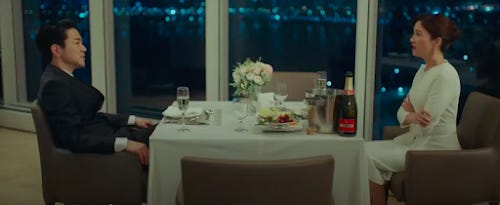
I liked the way Dong-jae was humanized in these episodes. (Lee Joon-hyuk can do no wrong as far as I'm concerned) He wasn't my favourite person last season but he was always an interesting foil to Si-mok. But here he's much more than just a bootlicking social climbing public servant. He's also a husband and a father who is playing the game so that he can spend time with his family. I'm looking forward to what they do with his disappearance. It's the injection of the x factor that's been sorely missed after a rather prolonged set-up.
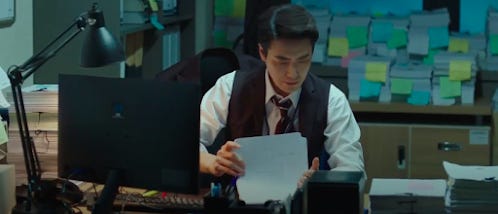
It is a strength of this drama (as it is with all good ones) that people aren't simplistically "good" or "evil". Everyone has things they care about and want to protect. But the reality is that often those things don't line up with what's actually good for the general public.


